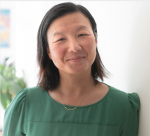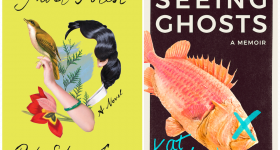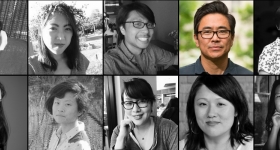On a sunny morning in June, I interviewed Naomi Hirahara as we explored the Huntington in San Marino, California, a lush 130 acre botanical garden on the former estate of the railroad magnate Henry Huntington. Naomi Hirahara is a celebrated figure in the detective fiction community for her novels, which display a profound knowledge of Japanese American California lore. A former editor of Rafu Shimpo, the longest running Japanese daily newspaper in the country, she is the Edgar Award-winning author of a seven book noir series featuring an amateur sleuth, septuagenarian Mas Arai, who might have the genre’s most unique backstory as a kibei and hibakusha.
As we walked, we discussed her newest freestanding novel Clark and Division (August 2021) set in 1940s Chicago. Here Hirahara centers the shocking death of a young Japanese American woman against the backdrop of the displacement and resettlement of West Coast Japanese Americans into the Midwest after WWII-era internment. We talked about the timeliness of her novel given the surge in anti-Asian violence, the legacies of Japanese American WWII incarceration and her vision for the role of detective fiction in exposing histories pressured into silence.
This interview has been edited for length and clarity.
You are known for your L.A. writing. Can you talk about what inspired you to write about Chicago?
So when I was working at Rafu Shimpo, I had so many nisei friends who in their 20s lived in Chicago. I also knew some sansei who were born in Chicago. Many later moved back to Los Angeles. The more research I started doing about what happened to Japanese Americans after the incarceration, I learned that Chicago was the number one destination for resettlement. I did a deep dive into reports from various Japanese American Resettlers Committees, formed because these young niseis were getting in trouble. And I never forgot this one paragraph from a delinquency report in 1946. The report states yes, there’s abortions, there’s children being born out of wedlock, there’s a stick up man and there’s a “sexual maniac” — and they didn’t use the word rape, but you can infer — someone who had sexually assaulted several women. The report identified it was several women, but I've never heard about this history. In Chicago, the average age [of] nisei [was] mid-20s and they were the first to be released from camps because they had to prove they were loyal while their parents had to stay back. So of course they're going to act out. What must [it] have been like for these young people without their parents living in Chicago? Writing this novel gave me a chance to show their humanity.
Such a fascinating and little-known story. What was your process for developing this history into Clark and Division?
When I decided to tackle Chicago, one person that was really instrumental was a Chicagoan and community historian named Eric Matsunaga. He interviewed a number of people when they were alive. I wanted to pick a very specific neighborhood, but for example, with Lakewood with the story of Iva Toguri (Tokyo Rose), I'm an outsider so I felt I couldn't tackle it. But not that many people know about Clark and Division, which was one of the early places that people settled maybe for a year, and then they moved on to other places. When I visited, Eric gave me a tour, and there’s hardly anything left of nisei presence in the Clark and Division area. People who live in Chicago, they didn’t even know. So I got to thinking I’m all right to get to do a deep dive into this place.
Another thing that helped me was to look into abortion. It just so happened that the book When Abortion was a Crime I referenced looked heavily at Chicago in the ’40s. In my research nobody would say, “I knew somebody that had an abortion,” so I thought, I have a place as a mystery writer to contribute using all this history. Of course, a lot of what I can also do is to eliminate the model minority myth. The predominant story is like, look at these Japanese Americans: They were released from camp, and they succeeded. But no, if you look at the history of Clark and Division, what you get is something different.
With the exception of Ellie Rush, who is a cop, your other protagonists — Mas Arai, Leilani Santiago and now Aki Ito — are unwitting detectives. Can you talk about what motivates Aki to investigate what happened to her sister?
Clark and Division is the story of a younger sister in the shadow of her older sister. Will the younger sister be able to carry out the responsibilities generally taken on by the oldest daughter? There is the weight of being the oldest, but if you accept the mantle there's a lot of perks. I love the mystery genre because it gives our character[s] agency. Things are so bad so they have to take action and for me that is exhilarating as a storyteller. Aki may be thrown into this position, but she has to find out what happens to her sister. It becomes her duty.
Hearing you describe it as a novel about sisters helps me to understand Aki. She is not applauded for being a sleuth. She risks losing it all, including being shunned by her parents, jeopardizing her friendships, first love and her job for looking into what happened.
Yes, the antagonist for Aki is silence. I mean there is a guilty person, of course, but Aki struggles against a pressure to be silent. The government is telling Japanese Americans that they are not allowed to gather in groups of three or more. You’re ashamed of who you are. Unlike Aki and her family, maybe other folks were finally out of camp and got to make a life for themselves and things weren’t so bad. They don't really have to deal with what they went through but maybe years later or the next generation they have to untangle the meaning of camp and being dispersed to Chicago. But Aki doesn’t have that option to defer. If Rose did not die, maybe it wouldn't be something she would have to dredge up at that particular moment.
I think the one thing I love about mystery is that everyone knows there’s going to be a dead body, they know there's going to be suspects and people with agendas. I think in some ways that’s how I can write the truth of our community, and the community members go along with it because they know all this vice and dirty secrets are a part of the genre. It is expected; whereas if I was just writing nonfiction, they would ask why I am airing our dirty laundry.
Can you explain why you are drawn to the genre of noir?
There’s a lot of former journalists who have become crime writers. At the Rafu Shimpo, you're dealing with people who are contacting you and they have an agenda. One of those stories I was covering was an Asian American woman who went missing at UC Berkeley. I was in touch on the phone with the white boyfriend who was leading the way to find her, and of course, at the end he was the one to kill her. I was in my 20s and it was an awakening — never take what someone says for face value. There is this suspension that starts to generate in a journalist’s mind so I think some of that is present in all my work.
I see this as a genre that has been historically hostile to Asian Americans. When I first read Summer of the Big Bachi, the first image that came to my mind was the figure of the Asian gardener in the Roman Polanski film Chinatown, whose accented English Jack Nicholson’s character derides. Can you talk about how you see your work within the field of noir and criminal fiction?
I was so happy to see that question because a lot of times early on when I would talk about Mas Arai and why I made him a hero, I referenced Chinatown. He [Nicholson] makes fun of the Asian gardener, thinking he was mispronouncing “grass” by saying “glass.” But he meant to say “glass,” which was the seminal clue.
Exactly, and Nicholson’s character couldn't see it because he was so racist.
Right. That character was referenced as "Asian gardener” in the movie and I wanted to give that gardener a name, so that was my task. I wanted to write a character like my father. In my fiction world I can write the truth in a different way.
Are you optimistic that noir would support more people of color authors?
I am hopeful. When I was starting out there was Dale Furutani who wrote Little Tokyo and he was very generous. He reached out and offered to blurb my book and that was so kind. Sometimes when you get into this field, there's competition and people feel like there is only room for one Japanese American writer, so stay out, and so he was a good model for me.
In addition, Black mystery writers have been able to take a stab at racism and open up their communities to us all. Authors like Walter Mosely, Chester Himes and Barbara Neely showed me the possibilities of how that can be done in an interesting way, in a way that makes you want to read multiple books. Right now with the anger and pain over the murder of George Floyd there more Black authored books published and publishers [and] agencies [are] saying, we’re not interested unless you’re BIPOC. But it’s still challenging for these stories to get a large readership because traditional publishing is so dependent on factors authors can’t control.
Your novel is timely. While WWII-era concentration camps and the post-war dispersal is the overall context for the novel, you chose to tell this story through the lens of gender-based violence. Can you talk about the relevance of your book for our current moment?
When it comes to gender-based violence, that's when people argue, "Yeah. We need police." We needed the police to eliminate or control. But then in Clark and Division, it has to be the community that steps in. We need community solutions. Especially for Aki and her world, they can't ever rely on the police to be the end-all. So the book questions: What other ways can we address violence like this?
I love how you left the ending unresolved. Can you tell us what is next for Aki?
There is a sequel. I have them returning to L.A. and the novel is set in Boyle Heights. It's going to be called Evergreen.










Comments